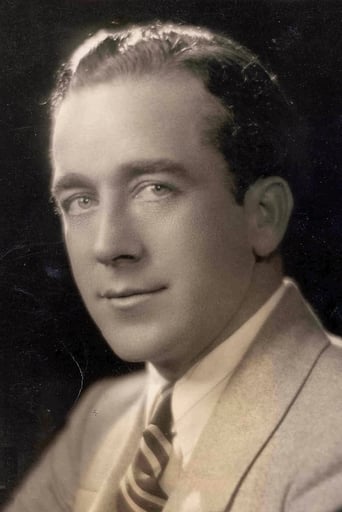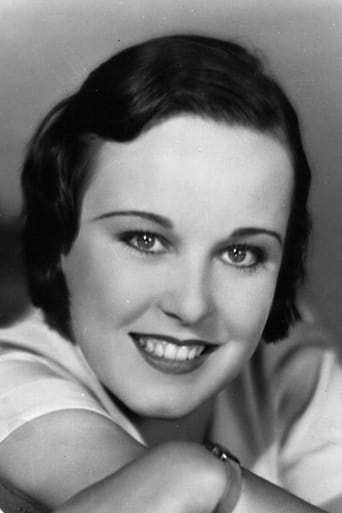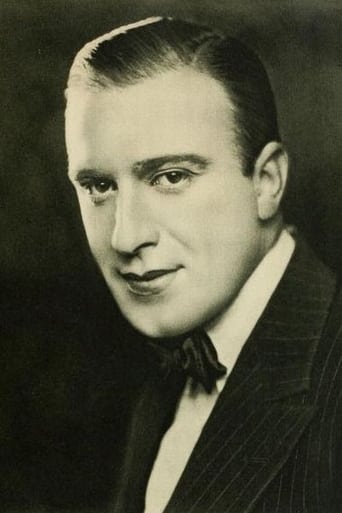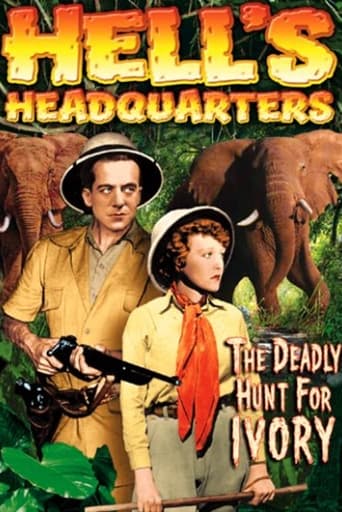
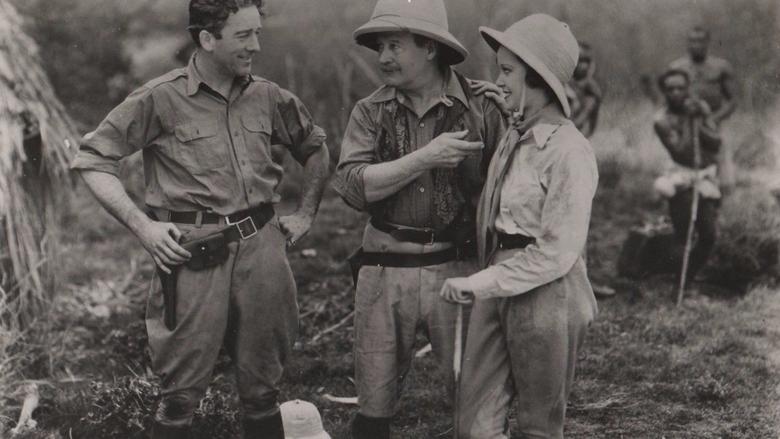
Hell's Headquarters (1932)
Doctor Smith and his wife, Mary,depart a riverboat and are met by Phil Talbot. Phil informs Dr. Smith that Jessup, the only other white man in the village, has died while the doctor and his wife were off on a two-day holiday. Unknown to Smith, Jessup and his partner, Ross King, had a large cache of ivory tusks in the jungle, and he had told Phil about it. Meanwhile, Mary Smith has decided to steam-boat down the Congo River to Capetown for an extended holiday. Kuba, King's gun-bearer, asks Smith to write a letter to King, currently residing at a New York City Explorer's Club, and advise him that his partner has died. Talbot sends a letter to his stateside sweetheart, Diane Cameron, and her father, asking them to come to Africa and join him on an ivory-treasure expedition, and replenish their family-fortune lost in the recent stock-market crash. What Mr. Cameron and Diane don't know about Talbot is that his years in Africa have unhinged him...
Watch Trailer
Cast
Reviews
To me, this movie is perfection.
Just what I expected
Let me be very fair here, this is not the best movie in my opinion. But, this movie is fun, it has purpose and is very enjoyable to watch.
The acting in this movie is really good.
This creaky jungle adventure from poverty row outfit Mayfair is as bad as most of the others but historically interesting as one of the earliest films directed by the estimable Andrew L.Stone, who has inexplicably never received the cult following he merits for a run of white-knuckle location-shot thrillers he made twenty years later that kept audiences on the edge of their seats throughout the fifties, and again during the seventies when they resurfaced on TV.Stone also directed the all-black musical 'Stormy Weather' (1943) and made an action hero of Woody Strode in 'The Last Voyage' (1960), so it's probably not just coincidence that the Africans are permitted to be slightly smarter and more resourceful than usual at this time. The villain, in addition to being a skunk, a murderer and a coward, is also a racist; and in a little bit of pre-code rough justice meted out at the film's conclusion (SPOILER COMING) two of his porters deliberately allow him to escape knowing that one of the stock footage lions will deal with him more satisfactorily than the authorities.
During the 1930s and 40s, Hollywood must have made a bazillion jungle films. And, aside from a few (such as the Johnny Weismuller 'Tarzan' films), most were just terrible--consisting of super-low production values, lots of stock footage to pad the film and bad acting. In this sense, "Hell's Headquarters" is yet another film in this grand tradition! When "Hell's Headquarters" began, the first thing I noticed was just how bad the acting was. Actor after actor delivered their lines like dyslexics reading cue cards! It was pretty funny, actually--and occasionally worse than you'd find in Ed Wood's "Plan 9 From Outer Space". As for the story, a man and his daughter agree to finance an expedition to get ivory in Africa. There are two problems--the money they use is the last of their once-substantial fortune and the man they entrust it to is pure evil. He's already murdered one guy to learn the secret location for the ivory--and he seems very ready and willing to do it again. This gets to one of the biggest problems with the film's plot--Phil is so obviously evil you wonder how the man and daughter don't recognize it immediately. He does a lousy job of hiding it and spends most of his time beating natives and acting nasty in a variety of other ways. Now this isn't completely dull, as the film occasionally manages to be interesting--such as the scene where the man breaks his ropes by putting his hands over the fire as well as the grisly ending. But, most of it is just one-dimensional and silly. While not a horrible film, it certainly isn't good by any standard.
The title frame optics informs the viewer that: George W. Weeks presents HELL'S HEADQUARTERS, followed by a tagline line (which is not part of the title but probably soon will appear as an AKA) which reads "A Story of Ivory Hunting in the Congo". And then the crew-credit sheet followed by the cast sheet.Then comes the foreword highlight on a scroll sheet, thusly: "Every tusk, piece and scrap in the possession of an Arab trader, has been steeped and dyed in blood; every pound weight has cost the life of a man, woman or child; for every five pounds a hut has been burned, for every two tusks a whole village has been destroyed, every twenty tusks have been obtained at the price of a district with all its people, villages and plantations.It is simply incredible that because ivory is required...the rich heart of Africa should be laid waste."(signed) Stanley The assumption can be made that the quoted Stanley is Henry M.Stanley, but what follows on the film has little to do with what is described in the foreword. The film opens with Doctor Smith (Fred Parker) and his wife, Mary,(played by an uncredited actress whose thespian skills are only a notch above those of Dot Karroll in 1939's "The Adventures of the Masked Phantom) departing a riverboat and are met by Phil Talbot (Frank Mayo.) Phil wastes no time in informing Dr. Smith that Jessup, the only other white man in the village, has upped and died while the doctor and his wife were off on a two-day holiday. This comes as a shock to Smith (or as close to shock that Fred Parker was capable of displaying)as Jessup was doing right well when last seen by the good doctor two days ago. He would have still been doing right well if he hadn't confided with Talbot about a treasure trove of ivory tusks he and his partner, Ross King (Jack Mulhall), have squirreled away up the river and through the trees. This bit of ill-advised confiding with Talbot leads Jessup to an unexpected death, but Talbot tells the doctor he died of fever or colic or grippe or the screaming-jeebies and the doctor, just glad to be conversing with someone other than his wife, buys it. Meanwhile, Mary Smith has decided to steam-boat down the Congo River to Capetown for an extended holiday as Doctor Smith has told her that the jungle is no place for a white woman, especially one as ugly as she is.Then Kuba (Everett Brown), Bwana King's gun-toter and best-boy, asks Smith to write a letter to Bwana King, currently living it up in a daytime tuxedo at a New York City Explorer's Club, and advise him that his ivory-cornering partner has died. And when Talbot learns that Mrs. Smith will be dropping off mail at the Capetown post office, he sends a letter to his stateside sweetie, Diane Cameron (Barbara Weeks), and her daddy, asking them to come to Africa and join him while he liberates some hidden ivory and, as long as they are coming, bring along $10,000 to cover the expenses of this expedition. Diane is all for this, even though $10,000 will deplete the formerly-rich family treasure which vanished during a stock-market crash. This event, of course, make "great-depression" a valid keyword for this film, which it already is so no need to scurry over there and add it. There is also the possibility it was put there by a viewer of the film and it refers to the plot, and not the theme.What Daddy (Phillips Smalley) and Diane don't know about Talbot, who was a 30s' swell guy when last seen a few years earlier departing for Africa, is that the burden of carrying the white-man's-burden in the white-heat of Africa has unhinged him a bit. He carries a quirt and a lash and knows more racial slurs than a Grand Dragon of the Ku Klux Klan, and isn't a bit hesitant about utilizing most of his racist arsenal every five minutes or so.On the voyage over, Diane meets Ross, and becomes somewhat smitten with him and his 30s' swell-stories. They arrive at the jungle outpost and all the white residents, Talbot and Dr. Smith, are happy to see some new white faces, although Talbot is visibly put-out when he spies Ross, and the doctor doesn't seen to be none too pleased to learn that his wife has steamed back upriver with the new arrivals. Ere long, though, all hands are safari-trekking, through a jungle when long-shot stock footage is used, and through a dry-wash California creek during medium-shot new footage. Diane spooks a stock-footage elephant and Ross has to shoot this stock-footage elephant via editing magic, even though the direction of his shot is about 45 degrees to the right of the charging elephant.They trek some more and arrive at where the ivory treasure is hidden, except Ross has had some of his "boys" travel ahead and hide it somewhere else and it isn't hidden where it was hidden anymore. (Us lovers of poverty-row films know this was just a plot device to keep the producers of the film from having to pay Joe Rock rent for the use of stock footage showing 25,000 tusks in one pile.) But Talbot gets mad about that. He and Ross stage a swell 30's scuffling fist-fight, which goes on for about ten minutes, and only ends when one of them actually hits the other one. Talbot then cuts a trail through the jungle and gets eaten up by a stock-footage lion. Ross and Diane embrace, and this makes Daddy Cameron very happy as there isn't any better way to escape the great-depression than have one's daughter marry a swell, rich guy. Or see The End flash on the screen.
